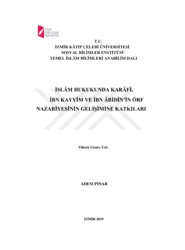İslâm hukukunda Karâfî, İbn Kayyim ve İbn Abidîn'in örf nazariyesinin gelişimine katkıları The contribution of Karafi, İbn Gayyim and İbn Abidin to the development of the theory of the custom in İslamic law
-
Eser Sahibi
Pınar, Adem
- Tez Danışmanı Ahmet Aydın
-
Tür
Yüksek Lisans
- Yayın Tarihi 2019
-
Yayıncı
İzmir Katip Çelebi Üniversitesi Sosyal Bilimler Enstitüsü
- Tek Biçim Adres https://hdl.handle.net/11469/2318
-
Konu Başlıkları
İslam hukuku
Islamic law
ÖZETFıkha kaynaklık etme bakımından önem arz eden örf nazariyesi, tarihsel süreç içerisinde gelişimini sürdürerek bugünkü konumuna ulaşmıştır. Çalışmamızda örfün bu gelişim serüveni de dâhil olmak üzere asıl olarak Karâfî, İbn Kayyim ve İbn Âbidîn'in örf nazariyesinin gelişimine sundukları katkı ele alınmıştır. Çalışmamız giriş ve iki bölümden oluşmaktadır. Giriş kısmında araştırmanın konusu, amacı, yöntemi ve faydalanılan kaynaklar ele alınmıştır. Birinci bölümde örf ve âdetin lügat ve ıstılahi tanımları yapıldıktan sonra, örf ve âdet arasındaki anlamsal ilişki ortaya konulmuştur. Meselenin daha iyi anlaşılabilmesi için örfün yapı, sıhhat ve kapsam olarak kısımları açıklanmıştır. Örfü kaynak olarak kabul edenlerin Kur'an, sünnet ve icmadan ileri sürdükleri deliller arz edilmiştir. Ardından örfün geçerlilik şartları ve İslâm mezheplerindeki konumu ele alınmıştır. Son olarak süreç içerisinde örfün Batıda ve Doğudaki gelişimi ortaya konulmuş ve bölüm değerlendirilmesi ile konunun alt yapı bilgileri tamamlanmıştır. Çalışmanın ikinci bölümünde
Karâfî, İbn Kayyim ve İbn Âbidîn'in aynı yöntem ile fakat ayrı ayrı olarak
hayatı, dönemindeki ilmî ve siyasi durum, ait olduğu mezhep ve takip ettiği usul bağlamında konunun tamamlayıcıları ortaya konulmuş, sonrasında örfün usul anlayışındaki yeri başlığı altında asıl konu işlenmiştir. Ele alınan her ismin ardından değerlendirme yapılmış ve elde edilen bulgular sonuç kısmında ifade edilmiştir.ABSTRACTThe customary theory, which is important in terms of fiqh sourcing, has reached its present position by completing its evolution in the historical process. In this study the contribution of Karafi, Ibn Qayyim and Ibn Abidin to the development of the tradition is discussed, including this development adventure. Our study consist of an indroduction and two parts. In the introduction part, the subject, aim, method and sources of the researc are discussed. In the first chapter, after the definitions of customary and customary dictionary, the semantic relationship between customary and custom is presented. In order to better understand the issue, the parts of the customary structure, health and scope are explained. Evidence from the Qur'an, the Sunnah and the ijmah by those who accept custom as a source is presented. Then, the validity conditions of the customs and its position in Islamic sects were discussed. Finally, the development of the tradition in the West and the East has been put forward and the background information of the subject has been completed with the evaluation of the department. In the second part of the study
Karafi, Ibn Qayyim and Ibn Abidin with the same method but separately
life, scientific and political situation in the period, the denomination and the follow-up in the context of the subject of the complementary components of the subject was put forward, then the main topic of the place of the understandig of the process is discussed. After each name, the evaluation was made and the findings were expessed in the conclusion.
-
Koleksiyonlar
ENSTİTÜLER
SOSYAL BİLİMLER ENSTİTÜSÜ

 Tam Metin
Tam Metin

